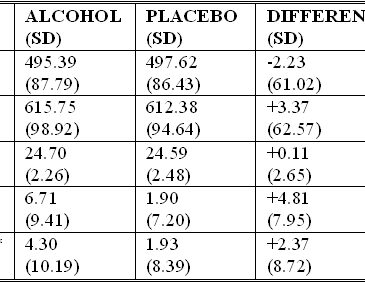In a national study, Wechsler et al. (2002) found that more than 40% of college students reported binge drinking (i.e., drinking at least 5 drinks in one sitting for males and at least 4 drinks for females) during the previous two weeks. The scientific literature suggests negative associations between binge drinking and college academic performance. However, experimental data about the influence of binge drinking on academic performance is limited (Engs, Hanson, & Diebold, 1996; Singleton, 2007; Wolaver, 2002). This week the DRAM reviews the first experimental study examining the effects of previous-night binge drinking on college students’ next-day test-taking scores (Howland et al., 2010).
Methods
- Participants acted as their own controls (i.e., they received both the experimental and placebo conditions) in a double-blind design.
- The 193 participants that completed the study were current and recently graduated college students aged 21 years and older from the Boston, Massachusetts area.
- Participants engaged in two overnight experimental sessions during successive weeks. During one session, they consumed alcohol to a target breath alcohol level (BrAC) of 0.12g% while during the other session they consumed a non-alcoholic placebo. The order of experimental and placebo sessions was randomized.
- Prior to beverage administration, participants spent 1.5 hours viewing and studying one of two educational videos on a public health topic. After 8 hours of sleep time in the controlled study environment, and recorded BrAC levels of 0.00g%, participants completed a variety of assessments.
- The investigators measured academic performance using a quiz based on the previous nights’ video along with verbal and quantitative questions from the Graduate Record Examination (GRE).
- The Profile of Mood State Brief Form (POMS) assessed mood disturbance.
Results
- Researchers found no significant differences between the alcohol and placebo consumption conditions for both lecture-based quizzes and sample GRE questions.
- Mood disturbance scores were significantly worse after alcohol consumption compared to the placebo consumption condition (see Figure).

Figure. Assessment outcomes by beverage condition (adapted from Howland et al., 2010). Note: All analyses controlled for the influence of gender and session number. NS = not significant. Click image to enlarge.
* Profile Of Mood States (POMS) – higher scores indicate a more negative mood state.
** 40 participants did not complete and return afternoon POMS assessments.
Limitations
- The study participants engaged in tests about an extra-curricular topic. It is possible that this resulted in a general tendency to underperform.
- Participants were not tested after a night when no drinking occurred. Consequently, the study had no measure of performance without drinking to compare to performance under the experimental conditions.
Discussion
This study showed that binge drinking, compared to drinking non-alcoholic placebo did not influence test-taking performance the next day. Nevertheless, drinking alcohol did negatively influence mood. Mood might influence other aspects of life (e.g., interpersonal relationships) that indirectly impact academic performance. In addition, Howland et al. (2010) measured performance after a single alcohol session, yet there are many occasions for college students to binge drink (Wechsler, 2002). Consequently, because the impact of alcohol consumption on academic performance might be short and/or long-term and the consequences of such drinking uncertain, we need more research to determine the impact and the mechanisms through which chronic alcohol use might affect academic performance.
— Erica Marshall
What do you think? Please use the comment link below to provide feedback on this article.
References
Engs, R., Hanson, D., & Diebold, B. (1996). The drinking patterns and problems of a national sample of college students. Journal of Alcohol and Drug Education, 41, 13-33.
Howland, J., Rohsenow, D., Greece, J., Littlefield, C., Almeida, A., Heeren, T., et al. (2010). The effects of binge drinking on college students’ next-day academic test-taking performance and mood state. Addiction, 105, 655-665.
National Institute of Alcohol Abuse and Alcoholism. (2004). NIAAA council approves definition of binge drinking. NIAAA Newsletter (3), 3.
Singleton, R. A. (2007). Collegiate alcohol consumption and academic performance. Journal of Studies on Alcohol and Drugs, 68(4), 548-555.
Wechsler, H., Lee, J. E., Kuo, M., Seibring, M., Nelson, T. F., & Lee, H. (2002). Trends in college binge drinking during a period of increased prevention efforts. Findings from 4 Harvard School of Public Health College Alcohol Study surveys: 1993-2001. Journal of American College Health, 50(5), 203-217.
Wolaver, A. (2002). Effects of heavy drinking on study effort, grade point average, and major choice. Contemporary Economic Policy, 20, 415-428.




